A few years ago I wrote a blog post that got a bit of attention about WHY to tell kids the truth about Santa. Since then, every year around this time, people continue to find that post on the internet.
How we deal with Santa in our family goes against popular opinion but, if you celebrate Christmas, I think it’s important to thoughtfully consider what we tell kids about Santa.
I argue against telling kids that they will get gifts only if they are “good” because…
- Rewards and gifts (threats and bribes) don’t actually improve behavior or motivation or help kids learn.
- The message of “you’d better not pout or cry” is bad parenting advice because it discourages kids from expressing their feelings.
- Lying to children about Santa risks breaking down trust and your relationship with your child (and could even be scary).
- The story of Santa may mislead your child to think that kids of other faith traditions don’t get gifts because they are not “good kids”, rather than understanding that other kids didn’t get gifts because they don’t celebrate Christmas.
- Kids may also think that another child who got fewer gifts was “less good” rather than understanding that some families have fewer resources than others.
What isn’t in the original post is exactly HOW to talk about Santa.
What do you actually say to your kids?
How exactly do you keep the magic in Christmas?
How do you prevent your child from “spoiling Santa” for other kids?
Here are 3 mini-scripts for what to say to kids about Santa, keep the magic, and not spoil it for others. Please adapt them to fit your child’s age, their level of understanding, and your family values.
How to tell the truth about Santa
Explain that Santa is a symbol
Say something like this, “The Santa that you see in books, movies, and in stores is a person in a costume. People dress up in Santa costumes to remind us…
- …of someone who lived a long, long time ago called St. Nicholas who secretly gave money to people who needed it.”
- …to be kind and generous to other people in our family or even outside our family, especially people who have less than we do.”
Keep the magic
You and your kids can still play the “Santa game” if you want. Say, “Even though Santa is not a real person we can still pretend that he is because it’s fun to use our imaginations and believe in magic.” Ask your kids:
- Do you want to write Santa a letter and tell him what you want for Christmas?
- Do you want to set out milk and cookies for Santa and a carrot for Rudolph on Christmas Eve?
- Do you want to sit in Santa’s lap and tell him what you want for Christmas?
Don’t spoil it for others
Some parents worry that their child will tell other kids that “Santa is not real” and they will have to endure the wrath of other parents. Explain it to your kids this way.
- Say, “Some kids and adults might think differently about Santa because they want to play the ‘Santa game’. It’s ok for people to think differently about different things. You can join in the game if you want to–it’s fun to use your imagination and pretend–or you can stay out of it. You don’t need to tell other people that ‘Santa isn’t real’ because everyone likes to pretend sometimes, just like when you play with your [dolls, action figures, video games, watch movies], and you pretend that they are real.”
- If your child is arguing with another child about whether Santa is real, say “You think that Santa is real and you think Santa is not real. That’s interesting! Two people believe two different things.”
We hope that these mini scripts are useful for you to use and adapt to your family. For more information about WHY to tell kids the truth about Santa and what we did in our family check out this blog post.
What are your thoughts? How does this approach fit with your family values? Do you think it spoils the magic of Christmas when we tell the truth about Santa?

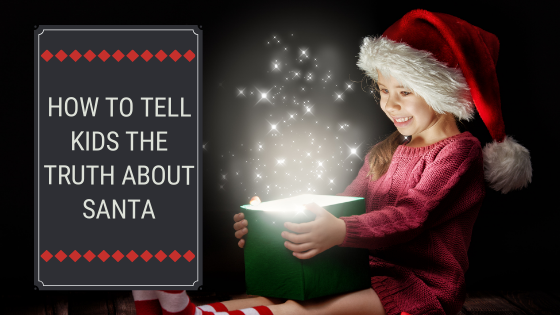
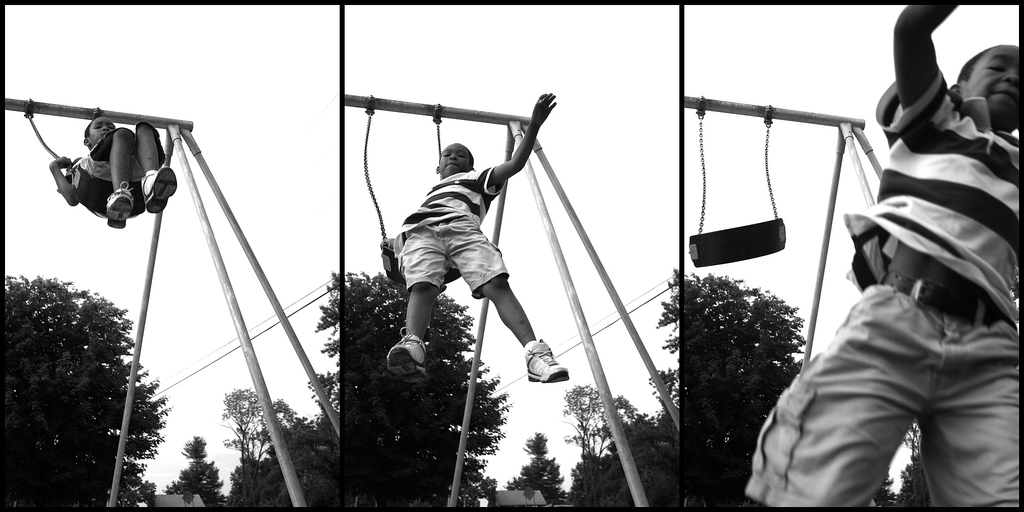

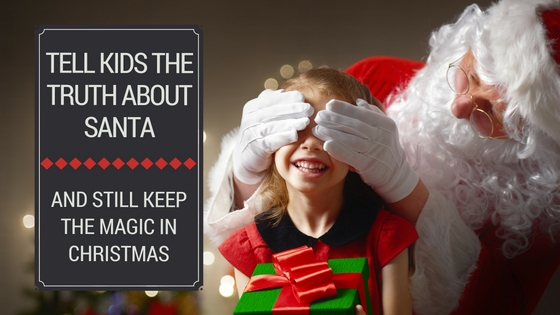
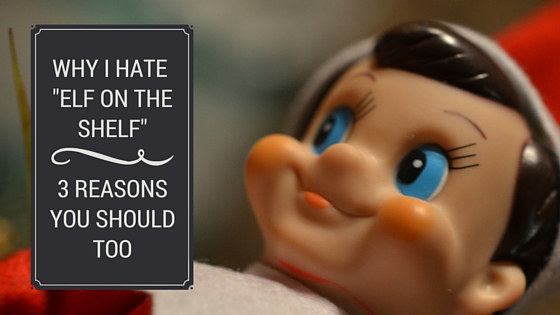
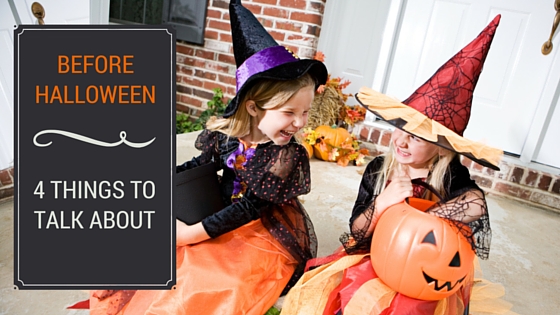



Technically, Santa can be real.
Santa is a role that anyone can take when they decide to help someone or give gifts to their loved ones during Christmas. I guess we can teach that to kids. Santa can be real because anyone can be Santa…
Santa is just not necessarily the white-bearded grandpa that travels around on a flying sleigh with magic reindeers.
I agree with that perspective too! We all have the kindness, joy, and generosity of Santa inside of ourselves.
I really love the description of how you celebrate Christmas in Estonia, where Santa is an actual person that walks through the front door. And yes, please adapt these “scripts” to fit your family, your situation, and your traditions. :)
Liina, I agree. Imagination is something that kids develop (or are born with). And it’s a wonderful developmental stage to see your children begin to distinguish between “real” and “make believe”. Your invitation for your daughter to invent a story is lovely… :)
But isn´t the imagination something we naturally develop anyway? And can it be that sometimes the story-telling is not even enhancing but limiting the imagination (by telling “how it is” we may replace the room for imagination with firm belief)? I really don´t know. But my own experience rather confirms it. I haven´t told any stories about Santa to my kid who is 3 years and 8 months old, but she has played Santa and brought me imaginary presents (empty hands in front of herself). She has experienced Santa only once – a month ago: it was somebody dressed as a Santa who gave her a present. In general we have followed Montessori that includes avoiding makebeliefs and fairy tales until the kid is at least 4 years old. She has had some contact with imaginary stories and cartoon characters by now but I have always explained that these are an imagination. Now she is able to differentiate pretty well for a 4 year old. She even adds sometimes after she has role-played an imaginary character “[The name of a character] is not real” (when she plays me or some other existing person she never does that). And still she uses her imagination on every day bases (not simply by repeating real experiences but also by telling imaginary stories about situations that have not actually happened to us – sometimes on her own initiative, sometimes when I invite her to invent a story). I believe that I am better able to enhance her imagination (if it is something that can be enhanced) by simply inviting her to invent a story instead of telling her stories myself. But it can be that one can not happen without another. Have scientists tried to find it out? Hmmm….
Thank you so much for preparing some scripts that people can use. At the same time I wonder what people have in mind when they say the exact words “Santa is not a real person” or “Santa is not real”. Especially the grown-ups. I would say that every Santa is a very real person – there are simply many (not only one). In addition Santa definitely is real because it is a existing phenomenon that has direct impact on many of us. Explaining it to a 4-year-old is complicated. It is less difficult in Estonia (where I live) though, because here we have the tradition that Santa comes in trough the front door – that is: somebody who has the Santa costume on actually enters the room where the kids are expecting their presents (on the early evening). Older kids and grown-ups are expected to read a poem or sing or do some other kind of performance to Santa. So, I can simply show that person to my child and ask: “I see him/her, do you see him/her too? Do you believe he/she is real or do we both imagine her/him?”. I do not tell stories of how (only one) Santa lives somewhere and has magical powers. I simply explain that he/she is the person chosen to share the presents that we have prepared for each other. Some parents also include the children in preparation: they will also have the opportunity to include something that they have drawn or crafted themselves as a present to somebody (when my kid is a bit older I will start it too, but she – now 3 years 8 months – has already played being Santa herself and bringing me imaginary presents – I think her imagination is pretty enhanced without me needing to tell her stories how Santa lives on the North Pole).
Kellie, that sounds tough when preserving the story so much work for you. And our kids put things together pretty quickly (when they see all the UPS boxes!). You have not failed your kids. It sounds like the other parents are just trying to preserve the myth for their kids. Big hugs to you.
Lizzie, with your son one idea is that you can start acknowledging his sharp thinking about Santa and he will eventually get it. “That’s a good question. I wonder how he gets down the chimney?!”
That’s wonderful, Hugh.
We had the talk about Santa with my 10 year old daughter this year, she seemed happier after we told her. She has 3 younger brothers and sisters and helps us find good hiding spots for our elf on the shelf, Bailey. She also helps us put out presents and is entitled to one of “Santa’s” cookies! Her younger brother(8) is starting to question the big jolly man! He said, “How does he fit down the chimney, how does he deliver all the presents in one night, how does he carry all the presents, how do the reindeer fly? My daughter Ella had said, “Mom, please tell me the truth. Is Santa real?” She was asking for 3 years, but all I would say is, “He’s magical!” So I told her this year. Should I tell my son that Santa Claus is not real? It would break his heart, though! He has enjoyed sprinkling Santa dust and leaving cookies so much, though!
Just stumbled upon this. I have three kids ages 11, 9, and 6. I have always struggled with the Santa lie but pressure from my husband and their friends parents has made me keep going with it. Obviously when my oldest figured it out at 7, I was honest and she kept it a secret from her siblings. Parents in our close knit neighborhood made me feel like I had failed somehow because I couldnt get her to believe longer. She’s just kind of an old soul. I do more with my kids than they ever do but I just failed at Santa. Now here we are in a pandemic, my kids are barely in school and we have UPS dropping boxes off daily. I’m a nurse and under a lot of stress between work and home, and maintaining the Santa myth has become even more stressful. I don’t want to scream “he’s fake!” after breaking up the 15th fight of the day because that’s just mean. But I really wonder why we even do this to ourselves and kids. Thanks for your validation.
Hi alla! Saint Nicholas is coming tonight😄 in our east european culture is celebrated in 6december and was far more famous than Santa, years ago…Even my daughter (9 and a half)seems to know ( she never said It outloud) they are not for real she doesnt mind….I’m going downstairs to put her present into her boots …It might be the last year she believes ☺ or not😁
Enjoy the celebration and time together! It’s interesting that in your culture St. Nicholas comes at a different time than Santa. In the US, the term “St. Nick” is a name used to refer to Santa, as if they are the same person!
That’s wonderful, Marija. You’re finding the balance between allowing him to have beliefs while not contracting your own.
Thank you for sharing this. Valid points. Although as an artist and therapist , I think that believing in Santa and exploring this magical experience about where he lives and how he travels all over the world to deliver gift really enhances a child’s imagination.
I understand trust is important but we can take things too far. One little white lie is not going to damage them!!
I agree, Aoife. It’s about balancing the message while still allowing kids to have fun with their imaginations.
Thank you for the scripts! I’ve been wrestling with this idea for years, and now that our son is three, he understands enough that we really needed to decide on our approach. I too didn’t want to send the message that someone is spying on you, and you only get gifts if you’re good. We recently purchased the story of St. Nicholas, A Children’s Adaptation, and we’re starting to explain that people play Santa to remember St. Nick, and be generous and give anonymously like he did. It makes so much sense to think of it as pretend just as any other make belief that kids enjoy while still understanding what’s real.
You’re welcome, Tiffany! That’s wonderful that you’re focusing on giving and being generous! xox
We have always had discussions with our now-5 1/2 year old that are very similar to this. She enjoyed the fun traditions and was totally fine with santa being a person in a costume. THIS year, however, she seems to be 100% on board with Santa being real. She tells us all the reasons he IS real, and why all the things work, like how he can deliver gifts to all the kids in the world in one night because the time zones change. LOL I am not sure how to handle this sudden conviction! It feels wrong to just blatantly contradict her fervor, but I don’t want her to think this whole thing is real!
Our daughter did the same thing for a while with the tooth fairy and accused us of lying. My advice: play the game with her, enjoy it, she wants to have the fantasy and use her imagination. It’s no different than her playing with her dolls. You don’t need to say, “Your doll isn’t real”. She already knows that. She’s just having fun.
I agree with this, kids give us the prompts we need of what to do and not… My son (now 8) started out really believing in Santa, then about 2 to 3 years ago he gave us all the reasons why he thought it would be impossible to be Santa and we didn’t disagree, kept it on the that’s interesting line, now this year he’s back to believing full force. We don’t say he is real or not real. However, we have set the ground work for there to be a discussion, when he’s ready, that will eventually lead to him letting go of Santa as a real person and embracing the myth.
I recently read a very good post about another way to tackle it, which is that it can be a metaphor for giving without expecting something back in return. Which again ties in to St Nick.
we have several traditions, which my 7yr old LOVES. One of them is that she ‘plays santa’ and has done so for as long as she can remember by making and wrapping gifts as a family for a nursing home, for her cousins, etc… its a point we reinforce and we LOVE our family tradition of ‘playing santa’ together… so when she figures out that im playing santa for her, i think it will make sense ; )
I love the idea of “playing Santa” for others. Sweet!